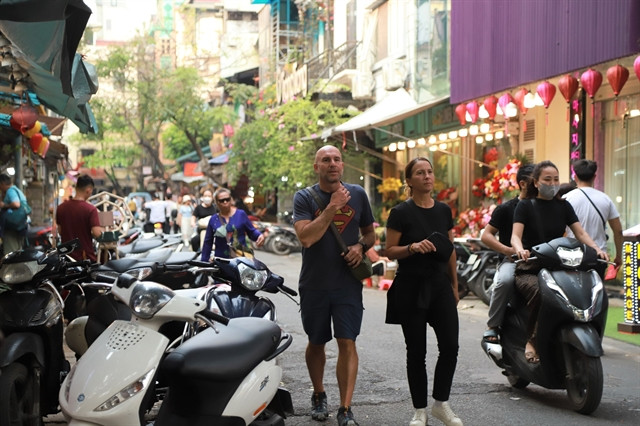
Shop owners have seen many attempts over the past decade to clear sidewalks of encroachment.
N.Q, who has a store in Cầu Giấy District, Hà Nội, said he has seen a lot pavement cleaning projects in Hà Nội, asking him not to park customer’s motorbikes on the pavement, but in the building’s basement 300m far away.
“We lost a number of customers every time like that,” Q said. “Not to mention, we have to call our staff to move customer’s bikes far away. We didn’t have many staff stay in the store.”
“I have spent VNĐ10-20 million (US$420-850) on renting this place monthly. I would not hesitate spending a couple million more to rent the pavement here so our customers have space to place their bikes instead of having to worry when do they start clearing the pavement again."
Hà Nội authorities said they have experienced certain difficulties in trying to clear pavements.
Nguyễn Huy Cường, Chairman of the Nam Từ Liêm District’s People's Committee, said they cannot oversee the pavements 24/7.
Every time after the authorities leave the place, people started to encroach again.
“It should be a long project, we cannot do it overnight,” Cường said.
“Along with executing the project, we are also finding a fundamental solution that can solve the backlog.”
Hà Nội has made numerous attempts to clear the pavements since 2014.
In 2015, they called it “the year of urban civilisation” with ambitions to create more positive results and create better conditions for pedestrians.
2017 and 2018 marked the years of their relentless efforts, which to enhance inspections and publish the detailed regulations on temporary use of pavements for urban roads in Hà Nội.
In February 2023, Hà Nội announced another campaign to clear 100 per cent of pavement encroachment with slogan: "To regain the clear, clean and beautiful sidewalks for pedestrians".
The capital city is now urging the completion of each milestone and regular maintenance to ensure that work is implemented efficiently and in an orderly manner. This is essential to prevent their efforts being in vain.
Experts have made recommendations over the best possible action to take to find solutions for all parties.
Nguyễn Quang Toản, Associate Professor at Hanoi University of Transport and Communications and former Head of the Road Department, believes pavement encroachment has always a burden in the capital.
“10 years of effort but we haven’t seen the results,” he said.
“We don’t have the resources to just inspect every pavement all the time. Raising awareness is important.
“We have succeeded in forcing people to wear helmets on motorcycle, as well as not to drink alcohol before they drive. Forcing to leave the pavement for pedestrians is the same, we just need determination to succeed.”
Toản suggested that Hà Nội canvass public opinion before beginning the effort to clear pavements. This would gather feedback from the public and use it for future communications on the issue.
The second thing, according to Nguyễn Quang Toản, is to heavily impose punishments to people using pavements for wrong purpose – including customers.
“Not just sellers, we need to punish buyers as well,” he said.
“If nobody buys, is there anybody there to sell? If customers strongly say no parking their vehicles on the pavement, can businesses force it? Clearing pavement should be an inclusive effort.”
Nguyễn Xuân Thủy, an urban traffic expert, former Director of Transport Publishing House, says lack of determination is the reason why Hà Nội cannot succeed .
He said Hà Nội needs to have a long-term project with monthly goals to inform people with information and actions. Small businesses that rely on pavement business need sufficient markets to ensure their revenues. With vehicles parking outside shops and restaurants, the city need to build parking lots.
“We are developing the public transport system in which pavements are very important. But how can people use it well if pavements are not clear,” Thủy said.
On February 2023, the HCM City's Department of Transport proposed a plan to charge pavement use for commercial purposes.
“Pavements according to Việt Nam Law of Roads are just for traffic and public use, not privately owned. Therefore it should belong to pedestrians, not for parking or commercial purposes,” Thủy said
“If selling pavements for economics, the city will be very serrated, the urban landscape will be disrupted, causing traffic jams, unsafeness and insecurity,” he added. — VNS